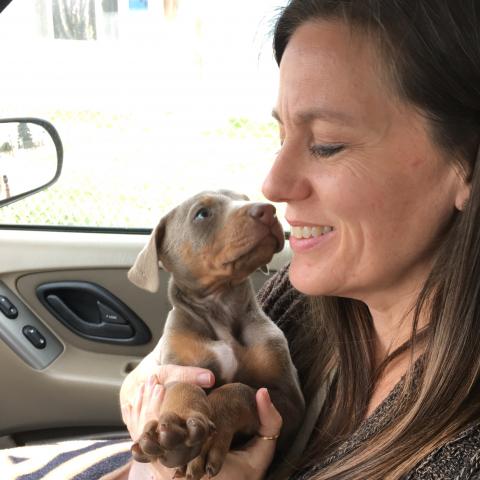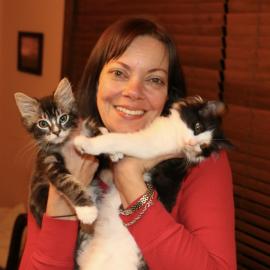Tracy J. - June 2021 Volunteer of the Month
Tracy J. has always had animals, whether they were cats, dogs, chickens, or goats. So it came naturally for Tracy to want to help the animals of our community as a foster volunteer.
About fifteen to twenty years ago, Tracy visited Multnomah County Animal Services to ask if she could help with kittens. While there was a foster program for kittens, foster volunteers were responsible for feeding supplies, veterinary care, and finding adoption placement for the animals. At the time, it didn’t seem like it would be sustainable for Tracy to volunteer.
Kitten Triage Program Restructured
Later, Tracy heard that the foster program at MCAS had been restructured, offering more material and veterinary support. Tracy started volunteering in 2017, and has been a pillar of the kitten triage and foster program every year since. She estimates that she has fostered forty to fifty kittens to date. As a school district employee, Tracy is usually able to go all in with fostering during the summer.
Tracy has had two “foster failures” that she adopted- Ellie and William. “Ellie, I started fostering when she was three weeks old,” Tracy says. “It was just a good time for me to get a new kitten. She was really fun, and it was time for me to adopt. WIlliam was my last kitten I adopted. I started fostering him when he was three days old. I needed a boy kitten, and I had recently had to put another cat down. It was an experience that really broke my heart, and William helped fill it. But all my fosters are special to me. They’re all in my heart and I love working with the kittens. None of them stand out above the rest.”
Neonatal Kittens
While Tracy enjoys fostering kittens of any age, the neonatal kittens are her favorite, but also the most challenging. Tracy loves when people she knows or their friends and family adopt her foster kittens, because she gets to continue to see the cats grow up in loving homes, and it serves as a reminder that her volunteer service has a positive impact, and it makes it worth some of the hard things she experiences. “One coworker has adopted two foster kittens from me,” Tracy says. “She is an amazing person, and built a whole catio for them. It feels really good to see how loved Frankie and Gus are in her home.”
The biggest risk with neonatal kittens is failure to thrive, and kittens without their mother have the highest mortality rate. This is why it’s vitally important to take time to look for a mother cat when kittens are found in the community, they have the best chance of survival with their mother’s milk and warmth.
“For me, the most challenging aspect of fostering is when I know that I can’t do anything more to help them and they fail to thrive, or when a veterinarian recommends humane euthanasia,” Tracy says. “Someone recently asked me about no-kill shelters and ones that euthanize animals. I think it’s a lot more complex than that common black and white assumption. In my experience, MCAS does absolutely everything they can before considering euthanasia.”
“People at the shelter, especially the Foster Coordinator, Jen, and the Kitten Triage Coordinator, Jackie, have been wonderful to work with, and do everything they can to help. But it can still be hard.
Support Network
Tracy has two adult daughters, Jordyn and Jaclyn, who are extremely helpful with fosters. “If I have young bottle-babies, they are happy to watch them while I run errands or get groceries,” Tracy says. “It can be important to tap into your network for support from family, friends, and shelter staff and volunteers. Everyone wants to help.”
Fostering During the Pandemic
During the COVID-19 pandemic, Tracy’s foster kittens were some of the first adopted through the newly developed virtual adoption process. “Shelter staff put in a lot of work developing the process, and the adopters were super patient while it was being worked out. We were the test subjects, and I think there were a lot of improvements made through that first experience. I’m grateful that it worked and that the kittens went to people who were already attached to them.”
Advice to Interested Volunteers
Tracy’s advice to interested volunteers is to just give it a try. Fostering kittens can be messy in many different ways, but it is rewarding. For actual messes at home, Tracy does everything she can to keep the space clean, and to keep the kittens separated from her owned animals. Having the right equipment can make all the difference. “I use a playpen that’s enclosed for my kittens. That has been a huge help to monitor them, and to keep them separated from other animals, and to only have to regularly clean a smaller space. I also have a large carrier for transport, and lots and lots and lots of blankets and towels. You will want to have a bunch on hand, because you’ll go through several each day.”
Helpful Resources
If you’re looking for helpful resources to foster or care for kittens, Tracy recommends several.
- The Kitten Lady Youtube Channel
- The MCAS Kitten Foster Handbook
- Speaking with MCAS staff Jen S. and Jackie V. for individual advice.
Tracy is one of the most caring and cool headed fosters/volunteers I know, with a go-with-the-flow kind of attitude. She truly pours her heart and soul into her fosters and she raises some of the most well adjusted kittens ever. We are lucky to have her on board.
Thank you, Tracy, for your service to the pets and people of Multnomah County through your work as a foster volunteer.




